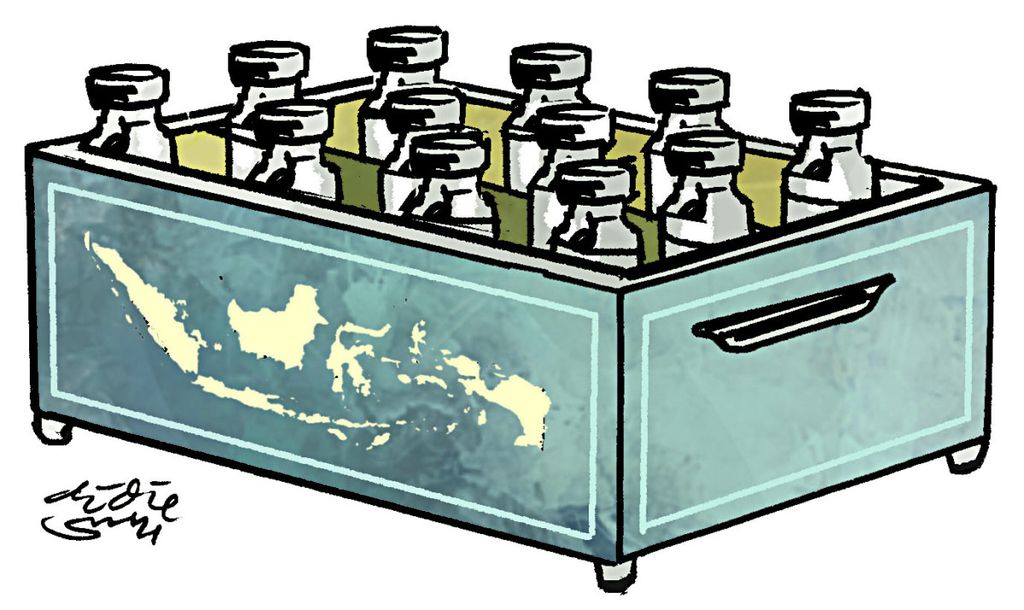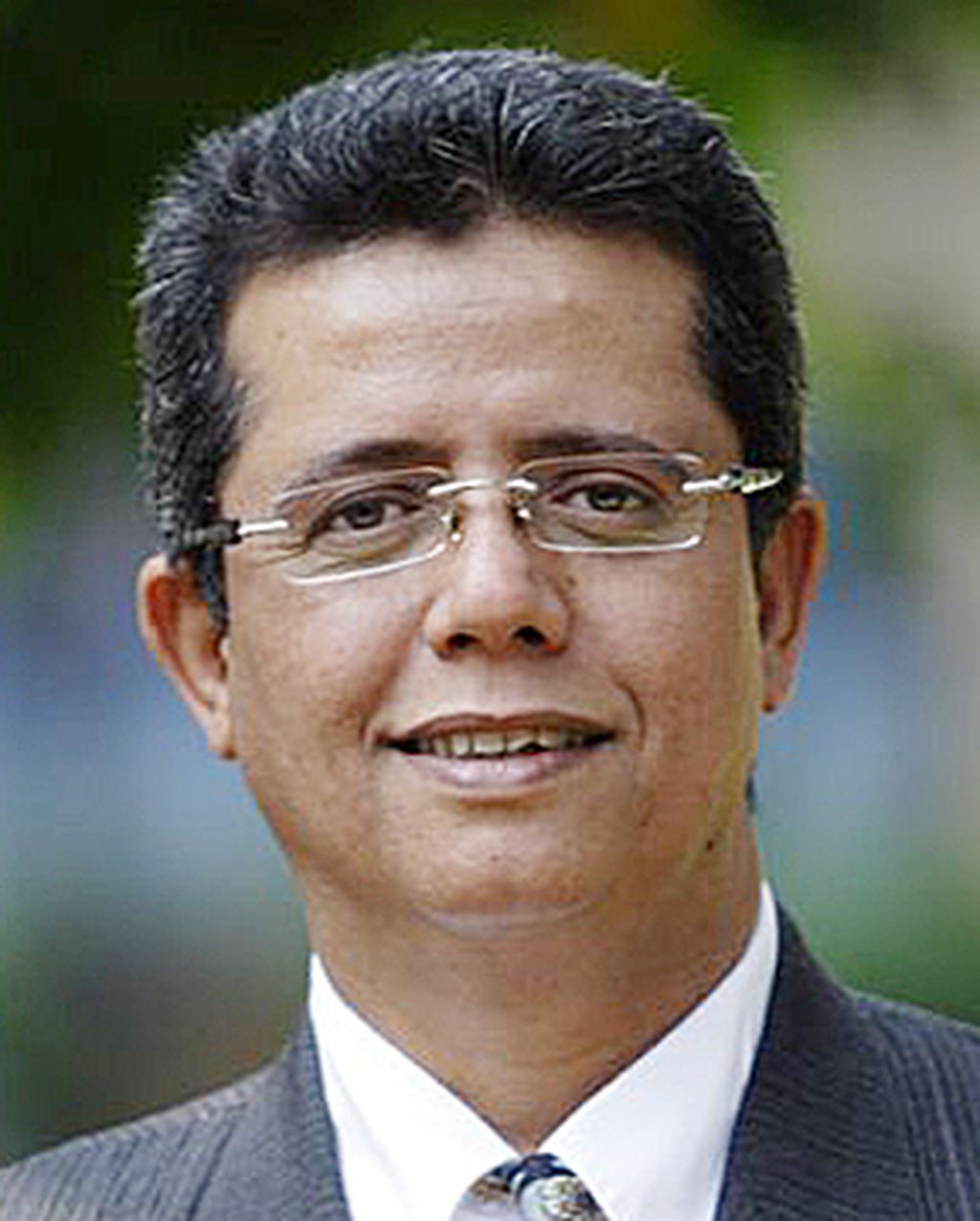Improve Vaccination Program
In fact, the disease will persist for the next few years, and it looks likely to turn into an endemic in some countries, not pandemic (worldwide) anymore.

The largest vaccination program in history is rolling out.
As of March 20, more than 420 million doses of coronavirus vaccines were injected in 133 countries, with an average of nearly 10 million doses a day, according to Bloomberg.
China, the most-populated country, injected 65 million doses for 2.3 percent of its population, India 41 million doses (1.5 percent) and Brazil 15 million doses (3.7 percent).
Indonesia has so far injected only 7.3 million doses for 1.4 percent of the population. However, we are yet to be assured that Covid-19 will be gone soon. In fact, the disease will persist for the next few years, and it looks likely to turn into an endemic in some countries, not pandemic (worldwide) anymore.
Vaccines can save us by slowing down the spread of the virus. The subsequent lessening impact will allow room for compromised lockdown rules.
However, the coronavirus, is far from being eradicated. The virus will continue to linger vastly, especially when it is realized that it may make the human body its "permanent domicile".
Also read: Vaccinations Permissible during Ramadan Fasting
What the future holds for this "war" depends on how countries respond with effective measures, particularly in the production and distribution of vaccines to protect 7.8 billion people as quickly as possible.
Meanwhile, 85 percent of countries in the world have yet to start their vaccination program.
Some countries are cautious about its efficacy that if the vaccination program is slow, the effect of the first injection may have disappeared before the second jab is given (The Economist, 1/2/2021). Meanwhile, 85 percent of countries in the world have yet to start their vaccination program.
With billions of people on the injection list, worldwide vaccination program is expected not to be completed until after 2023, which means the virus will by then remain to be freely lingering on the planet.
Not a recipient of social assistance
Amid efficacy concerns, the vaccination program in Indonesia must be improved. What is happening now is that people are registered, filtered – based at times on dubious selection criteria – and scrutinized for their ID cards and other identities, and so on.
The administrative process takes a long time.
According to Bloomberg, we are only able to inject about 320,000 doses of vaccines per day, still below Brazil (370,000 doses), and far below China (960,000 doses). India has been the most aggressive nation with about 1.8 million doses per day.
In order to achieve herd immunity for Indonesia’s 181 million people, the injection rollout will need 568 days or one year and half.
We can understand the policy to prioritize health workers, public servants, national military and police members given their roles at the frontline of mitigation mission.
/https%3A%2F%2Fkompas.id%2Fwp-content%2Fuploads%2F2021%2F02%2F20210223AGS16_1614092675.jpg)
A medical worker administers a Covid-19 vaccine to an elderly person at a community health center (Puskesmas) in Duren Sawit, East Jakarta, on Tuesday (23/2/2021). Each day, the health center administers 20-50 doses of vaccines for elderly people. Health Ministry Covid-19 vaccination spokesperson Siti Nadia Tarmizi said the current second phase of the vaccination drive was for public service workers and elderly people. In the case of the elderly, the first and second shot of the vaccine are given with a 28-day interval. For people aged 18-59, the vaccines are given with a 14-day interval. According to Health Ministry data, an additional 16,297 people received their first vaccine shots on Monday, bringing the total to 1,244,215 people. With the limited global supply of vaccines, the government prioritizes the vaccination of high-risk people to lower the mortality rate.
However, apart from them, people should be free to come to vaccination stations.
The ongoing sequence of procedure is that people have their data recorded before receiving injections.
Vaccination recipients are not social assistance (bansos) beneficiaries, who have to undergo strict data filing scrutiny in anticipation for repeated distribution of the package to the same person.
Also read: Keep up the Vaccination Momentum
An elderly writer (former journalist), who is also a lecturer at a university in Jakarta, tells his grim story. Also a doctor, though not practicing anymore, he lives in Cisalak Pasar subdistrict, Depok municipality. With Cisalak Pasar being outside the 10 priority subdistricts for the first phase of vaccination in Depok, he has yet to receive a vaccination.
Given his age and profession, which frequently puts him in face-to-face interaction in public, he should be prioritized, but the ongoing system relegates him into the waiting list.
Imagine the potential risks from the fact that he lives with eight members of family, including his elderly wife, two grandchildren and two house maids, who regularly visit a market in another sub-district).
Two of their three children and a person-in-law also frequently go to Jakarta for work, which means opening more opportunities for virus transmission in the family. Fortunately, the neighborhood is strictly implementing health protocols.
While he is waiting patiently for his turn, he can’t help thinking what has gone wrong with the vaccination program his colleagues are implementing.
Seen through the medical lens, a mitigation program in the wake of pandemic emergency should be inclusive regardless of their ranks, occupations or identities.
In fact, if a foreigner is staying in Depok, even without any identity, for example, the person should also be vaccinated, considering the possible transmission a new variant of the virus, which is 70 percent more contagious.
It doesn\'t matter if a person has a local ID card, he or she can also be infected and become a virus carrier, because the coronavirus (and all other pathogens) does not compromise potential victims. In fact, if a foreigner is staying in Depok, even without any identity, for example, the person should also be vaccinated, considering the possible transmission a new variant of the virus, which is 70 percent more contagious.
Bottom-up Approach
The vaccination program should be done by implementing the bottom-up approach. For example, around 10,000 puskesmas (community health center) at sub-districts (based on data from the Health Ministry, 2018) promptly administer the vaccination, partnering with other institutions, such as schools in their surroundings, and using social networks from district, sub-district, neighborhood (RW) to units (RT).
/https%3A%2F%2Fkompas.id%2Fwp-content%2Fuploads%2F2021%2F02%2F20210224WAK08_1614348764.jpg)
A teacher undergoes a health check before getting a Covid-19 vaccine shot during a vaccinations for high school teachers at SMAN 70 Jakarta on Wednesday. The event was attended by 600 teachers and education staff. The vaccination program has come to the second batch, targeting elderly people and those employed in the public sector, such as market vendors, educators (teachers, lecturers), religious leaders, lawmakers, government officials and state institutions.
The RW head must coordinate with their RT subordinates in terms of priority to ensure the number of residents invited to the Vaccination Day is in accordance with the allocated vaccine load.
Puskesmas does not need to record data at the start. It is not urgent to screen ID or family cards. Instead, as soon as vaccines are available, promptly inject them (who meets eligibility requirements), based on the order of priority (for example elderlies come first), and so on.
Also read: Fulfilling the Pledge to Execute Vaccination
Of course, the execution must pay attention to medical principles, including examination before injection and post-injection monitoring. Only later do the participants have their data recorded and submitted to the sub-district.
The approach can help realize Health Minister Budi Gunadi Sadikin\'s campaign to increase the speed of injections to one million per day.
Apart from that, the private sector must also be urged to carry out vaccination program on its own.
As in the case of other national vaccination programs for children -- which provide free and pay options -- the government should be partnering with the private sector.
Let those who have money, choose to avoid queueing, or lack trust on government’s free program, turn to private health services. The important thing is that all vaccinated citizens have their data recorded.
Such a step will be helpful for those who do not have mobile phones or subscribe to technology, so find it difficult to get into digital systems.
Does it really matter if the data records at the neighborhood mismatch those at puskesmas, a chaos we at times find in data filing system?
Do you still remember the single identification number stored on the chip in your e-ID cards, which was once an object of corruption?
/https%3A%2F%2Fkompas.id%2Fwp-content%2Fuploads%2F2021%2F01%2Fb568eaa5-f8cf-48b2-ab68-7bff98850c8e_jpg.jpg)
Employees transfer a box of Covid-19 vaccines from a truck, belonging to pharmaceutical company Bio Farma, to a storage room at the West Nusa Tenggara Health Office in Mataram on Tuesday morning (5/1/2021). Although the vaccines have been distributed, the use of the vaccines await authorization from the Food and Drug Monitoring Agency (BPOM).
In the case of the ongoing pandemic, the important thing is that puskesmas can successfully immunize as many people as possible, regardless of their ID cards as long as they are domiciled in that vaccination area.
If the amount of vaccines does not suffice, residents can wait for invitations under the coordination of local officials.
There is no need to worry about someone being vaccinated more than required, because this is not the distribution of bansos.
Also read: Economics and Health Must Go Hand in Hand
If this model is not implemented, we are cautious that the government is only busy with data filing, which may be contra-productive to the herd immunity target.
We know that the government wants orderly procedures, but excessive order can instead interfere with the proceedings.
While accelerating research of virus mutations and preparing for the second phase of injections as well as dealing with those exposed to the virus, we can continue to improve the first phase, hoping that if immunity rates in the community increase rapidly and expansively. We know that the government wants orderly procedures, but excessive order can instead interfere with the proceedings.
When a tsunami happens, we tell people to rush to the hill. The more people can reach the hill, the more people can be saved.

Syafiq Basri Assegaff
Finally, it is important to educate people\'s behavior in the adjustment to health protocols.
People must realize that wearing masks and physical distancing may be the norm for the next few years. If not, of course there is worry that the black cloud of the pandemic (or endemic) will continue to cast a shadow over us.
Syafiq Basri Assegaff, A Doctor, Lecturer at the LSPR Communication and Business Institute, Jakarta
(This article was translated by Musthofid).